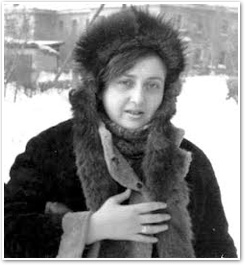Regina Derieva
- JOHN JANARO
Many literary critics consider Regina Derieva one of the great modern Russian poets.
 Regina Derieva
Regina Derieva1949-2013
Though she wrote on a variety of topics, her Catholic faith is clearly the horizon that illuminates all of her work. She found this faith while living in the late Soviet Union, at the end of a remarkable journey she shared with her husband Alexander Deriev.
Regina was born in 1949 in Odessa in Ukraine (then part of the Soviet Union) to an ethnic Jewish family that was firmly committed to Communist atheism. When she was sixteen, they moved east to the industrial center (and former gulag site) of Karaganda in Kazakhstan, at that time a physical, environmental, and spiritual wasteland.
Unable to conform to an evidently brutal, oppressive, materialist, totalitarian state, Regina began to ponder the mystery of reality and write poetry. Her writings alarmed both the KGB and her father, who tried to have her committed to a psychiatric hospital. Still she continued her search. In 1976, she married Alexander, then a young artist. They began together, quietly, to wonder about the "God" who had been banished from Soviet life.
They also knew about Jesus Christ, and slowly they were drawn to him. Alexander became fascinated by icon painting, and they both read whatever literature the state permitted. Dostoevsky proved to be a powerful influence; in his novels they were able to glimpse the striking presence and radiant beauty of the figure of Jesus.
This increasing interest in Jesus led them to visit some Russian Orthodox churches. Though they found further signs pointing toward God, they could not imagine living within a Church that was subservient to the state and effectively controlled by the KGB.
Then they visited Lithuania and encountered Catholic Christians for the first time. The "underground" Catholic Church was different: they began to realize that it alone had preserved the fullness of the relationship with Christ. It was "universal" — not defined by a particular system or place or nation or ideology but belonging to all people.
Here was the God they sought, the Christ whose radiance shined through icons and through the literature of Dostoevsky and others in a way that escaped the notice of the Soviet censors but showed itself to those who were searching for something greater than the iron cage of atheism.
There was even an underground Catholic church flourishing in Karaganda; a small but vibrant parish led by a Lithuanian priest, Father Benis. The parish gathered for Mass in an ordinary building that did not appear from the outside to be a church at all. Alexander and Regina decided that they wanted to become Catholic.
Father Benis welcomed them, but did not hide any of the dangers they would face. The Catholic Church was illegal, and therefore it was (officially) a crime to administer or to receive baptism. They were willing to take the risk. Father Benis, however, wanted them to know the Catholic Faith well and be firmly committed to it. He gave them instruction and further reading for a full year. Finally they were baptized in 1990. They found the glory of Christ hidden within a persecuted Catholic Church.
The Derievs emigrated in 1991, living first in the Holy Land and then Sweden, where Regina continued to write vivid, compelling poetry until her death in 2013.
 This is Meaghen Gonzalez, Editor of CERC. I hope you appreciated this piece. We curate these articles especially for believers like you.
This is Meaghen Gonzalez, Editor of CERC. I hope you appreciated this piece. We curate these articles especially for believers like you.
Please show your appreciation by making a $3 donation. CERC is entirely reader supported.

Acknowledgement
 John Janaro. "Regina Derieva." Magnificat (November, 2018).
John Janaro. "Regina Derieva." Magnificat (November, 2018).
Reprinted with permission of Magnificat.
The Author

 John Janaro is Associate Professor Emeritus of Theology at Christendom College. He is a Catholic theologian, and a writer, researcher, and lecturer on issues in religion and culture. He is the author of Never Give Up: My Life and God's Mercy and The Created Person and the Mystery of God: The Significance of Religion in Human Life. He is married to Eileen Janaro and has five children.
John Janaro is Associate Professor Emeritus of Theology at Christendom College. He is a Catholic theologian, and a writer, researcher, and lecturer on issues in religion and culture. He is the author of Never Give Up: My Life and God's Mercy and The Created Person and the Mystery of God: The Significance of Religion in Human Life. He is married to Eileen Janaro and has five children.




